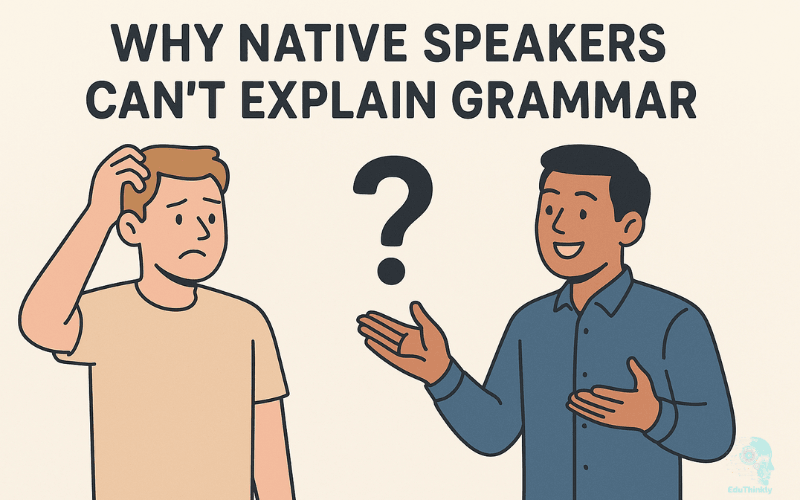Why Native Speakers Struggle With Their Own Grammar and How That Can Help You Learn Faster
english
15 Jul 2025, 20:50

Keep reading below:
Have you ever asked a native English speaker why they say “I wish I were there” instead of “I wish I was there” and got no real answer?
You’re definitely not alone.
Most native speakers honestly don’t know the grammar rules behind the sentences they say every day.
In this article, let’s explore why native speakers often can’t explain their own language and how that strange fact can actually help you get better at English than you might think.
Native Speakers Don’t Learn Grammar They Absorb It
From childhood native speakers pick up English naturally
They hear it repeat it and use it without thinking about rules
So when you ask them why something is said a certain way they often say
“I don’t know it just sounds right”
This is both their strength and their weakness
While they speak fluently they often can’t explain grammar patterns because they’ve never needed to
But as a learner you study the language consciously and that gives you a secret advantage
The Strange Grammar Rules Native Speakers Use But Can’t Explain
1. “I Wish I Were” The Subjunctive Mystery
Why do we say
I wish I were taller
Instead of
I wish I was taller
The answer is the subjunctive mood
This grammar rule expresses hypothetical or imaginary situations
Most native speakers don’t know what the subjunctive is but they use it daily
2. “He Had Had” — The Double Past Perfect
Yes this is real English
He had had enough of the noise
Confused? It’s just the past perfect tense in action
He had already experienced had enough
To a learner this makes sense when explained
To a native speaker it’s just a sentence they memorized without knowing the rule
3. Present Perfect vs Past Simple The Hidden Difference
Ever wondered why British people say
I have just eaten
But Americans often say
I just ate
Both are correct but technically the present perfect is for actions connected to the present
Many native speakers don’t know when or why to use it they just copy what they hear around them
4. Strange Comparison Structures
Ever heard this sentence
The more you know the less you need
It sounds poetic but it’s actually a correct parallel comparative structure
Native speakers use this pattern naturally without understanding why
As a learner noticing and understanding this gives you control over how you structure your own complex sentences
Why This Is Your Hidden Advantage?
Here’s the big secret!
Being a learner gives you awareness
While native speakers use English instinctively you’re learning it logically
You ask why not just how
That means in many situations you understand the language better than they do
Next time you feel frustrated as a learner remember
You can explain things that native speakers can’t
Conclusion: Be Proud of Being a Learner
Native speakers speak fluently but often without understanding the language they use
You on the other hand have the power to learn consciously notice patterns and grow your skills with intention
So next time someone tells you that your English is good for a learner smile
Because sometimes learners understand more than natives
Final Question for You
Have you ever noticed a sentence or grammar rule that native speakers couldn’t explain?
Share it in the comments let’s confuse them together.